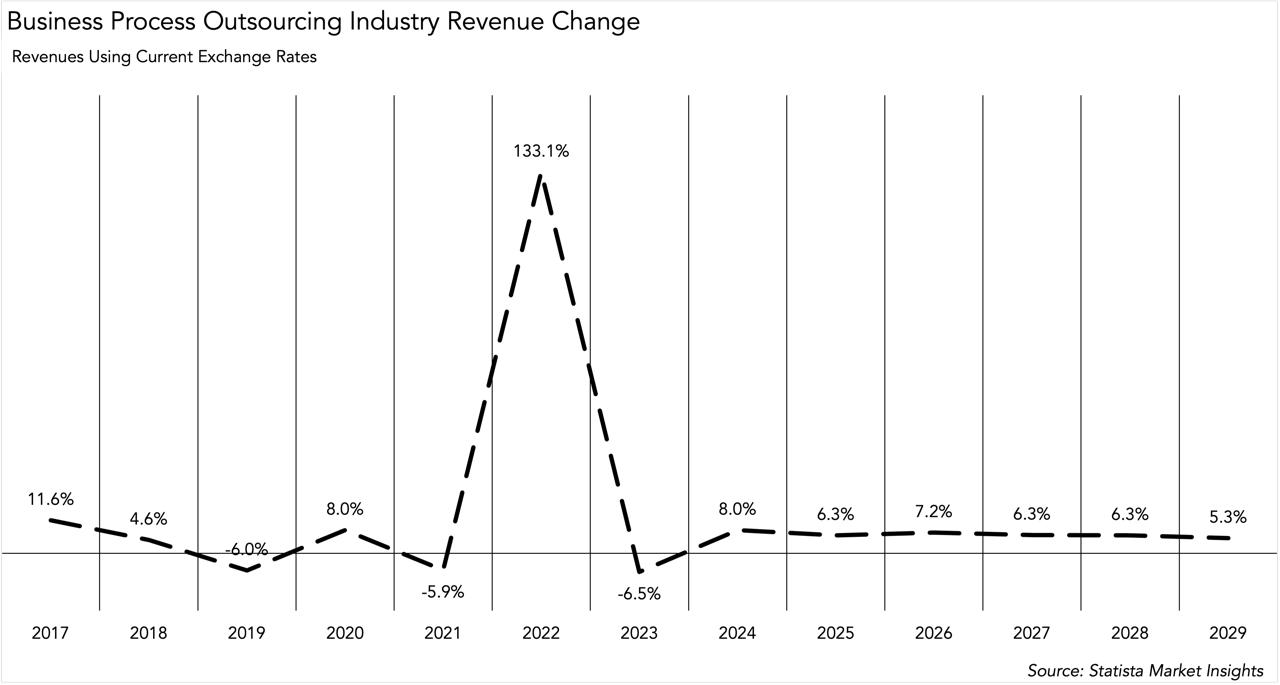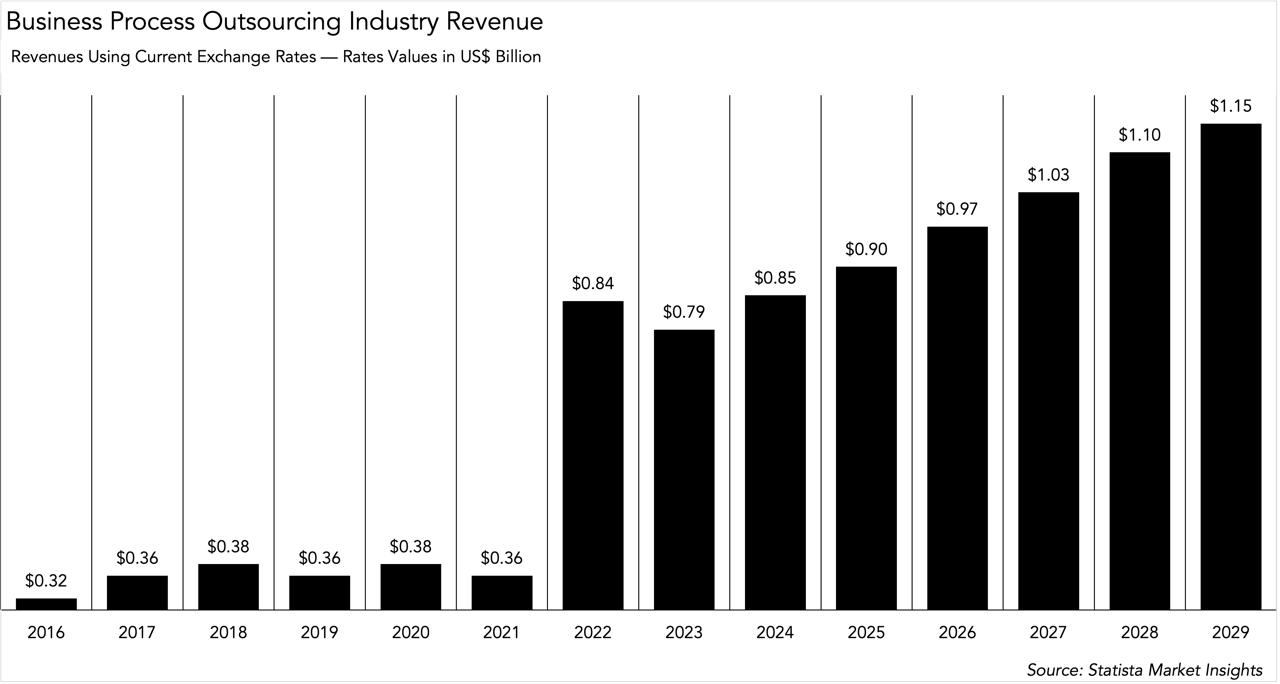Over the last decade or two, Pakistan’s business process outsourcing (BPO) industry has emerged as a significant sector in the country’s economy. Of the different offshore information technology (IT) services large companies seek, Pakistan has become a prominent destination for BPO services, due to the cheap labour it promises. The BPO sector has seen substantial growth, driven by a combination of cost advantages, a young and educated workforce, and the increasing global demand for outsourcing services.
According to recent estimates by Statista, revenue in Pakistan’s IT services market is projected to reach US$2.46 billion in 2024, with BPO dominating the market, accounting for a projected market volume of US$0.85 billion. The overall revenue is expected to grow at a compound annual growth rate (CAGR) of 7.31% from 2024 to 2029, resulting in a market volume of US$3.50 billion by 2029. This growth trajectory positions Pakistan as a promising player in the global BPO landscape.
As the local economy continues to stand on shaky grounds and our ever flailing local currency anticipates further devaluation, many, including the IT ministry of Pakistan, believe that the BPO sector will be the saving grace of Pakistan and its economy.
Sounds too good to be true? Well, despite the transformative potential of the sector, it might actually be too good to be true if we fail to get our act straight. Hot on the sector’s heels is an AI revolution, which poses a serious threat of not only disrupting the BPO landscape globally and in Pakistan but also creating mass unemployment.
Is artificial intelligence (AI) a real and pressing threat and what can be done to safeguard Pakistan’s IT sector from going under? Profit explore.
Is it too soon to worry about AI taking over?
In Pakistan’s BPO sector of Pakistan the core of the business primarily revolves around customer service, traditionally managed through call centres handling inbound customer inquiries. Agents provide services via phone calls, but a significant portion of the industry has now shifted towards non-voice communication channels, such as chat and email. These non-voice services are increasingly prevalent. Besides customer service, there are substantial operations in back office services, including data analytics, marketing analytics, HR, and finance. While customer service and call centres still dominate, other segments like non-voice support and back office functions are growing steadily and gaining prominence.

As AI technology rapidly advances, its applications have become both innovative and surprising. From teenagers using AI to generate witty diss tracks to companies like Toyota experimenting with highly interactive chat bots capable of human-like responses without any human intervention, AI seems to be performing tasks that previously required humans. And it might be some consolation that while AI tools are becoming more accessible, mastering their use requires significant expertise and understanding of the right commands to unlock their full potential, it may still very much be a serious threat to certain individuals and their jobs.
Capital will help as more of it goes into this space, but it has to come with experienced restructuring of the AI practice otherwise we’ll keep doing “bottom of the barrel” type work.
Now you may be wondering how long it might take for AI to significantly impact jobs in call centres and business processes? Specifically, when companies in the West adopt AI to a degree that they no longer need to outsource these services to countries like Pakistan.
Nadeem Elahi, Country Head and CEO of ibex Pakistan, Middle East & North Africa, answered this question, “Industry analysts project that about one-third of business processes could transition to AI, primarily due to its advanced capabilities in using large language models for intelligent human interaction. However, it is unlikely that the entire industry will move to AI.”
Elahi explained that generative AI excels in managing straightforward tasks such as providing product information or making simple decisions, which can be efficiently automated. More complex issues that require nuanced decision-making will still require human involvement. Therefore, while AI will significantly impact the sector, it will not completely replace human roles. The future likely holds a hybrid approach, with AI handling simpler queries and humans addressing more intricate problems.
He told Profit, “Our company (ibex), like many others, is exploring how to integrate AI into our services. Globally, it’s projected that about a third of the business may transition entirely to AI. However, predicting the timing is challenging.”

According to Elahi, in the short term, over the next one to two years, the BPO sector might actually expand rather than shrink until the transition to generative AI fully materialises, considering that human involvement remains crucial in the interim to manage and train AI systems effectively. Elahi estimates that, “In the short term, businesses might experience a temporary spike before a decline to the predicted 30-40% reduction due to AI integration. This shift faces two main challenges. Firstly, AI requires extensive training, involving human oversight, to ensure accurate customer interactions. Secondly, large companies must address potential legal liabilities if AI provides incorrect responses. The timeline for these developments is uncertain, as companies are still working on resolving these issues. Both the training of AI and mitigating liability risks are crucial steps that will take time to fully implement and stabilise.”
Speaking on the timeline of AI advancement and reverberating Elahi’s point, Soban Raza, Founder and CEO of Antematter, commented, “AI is certainly effective, but eking out actual gains from it requires investment into technology infrastructure and workforce training. For now, I think such an investment remains significant for smaller businesses but seeing the rapid pace of AI’s progression, I give it less than 5 years before even more complex tasks can be delegated to agentic AI.”
Is Pakistan’s BPO sector braced to welcome an AI revolution?
In the Pakistan Export Strategy for Business Process Outsourcing 2023-2027, the government argues that the sector currently possesses certain key fundamentals that can be leveraged as a competitive advantage against other BPO industries in the world.
The report claims that Pakistan’s high-value segments are emerging, with companies exporting digital tech to the U.S. for industries like oil, gas, and healthcare. Freelancing is booming, ranking Pakistan in the top three globally. Despite some weaknesses, Pakistan ranks 31st in the 2021 Global Services Location Index and is the second most financially attractive for offshoring IT-BPO services. Operational costs are 60% lower than in the Philippines. The IT and ITES industry benefits from a large, young, trainable workforce, producing 25,000 IT graduates annually. Pakistan has the third-largest number of English speakers, enhancing its competitiveness in customer-centric services.
Elahi agrees that there is an opportunity, however, saying that the industry, at this current stage, possesses key fundamentals to compete with other BPO regions might be a bit of a stretch.

“Compared to destinations like the Philippines, India, South Africa, and the Caribbean, Pakistan offers lower costs. This presents a short-term opportunity to employ many people. The challenge is reskilling these workers. Initially, employment should be the focus, following India’s model of moving from call centres and BPOs to knowledge process outsourcing (KPO) and IT over time. Pakistan has abundant, quality human resources and low costs, making it well-positioned to capitalise on this opportunity. The strategy should be to employ people in the short term and reskill them in the long term, viewing this situation as an opportunity rather than a threat,” Elahi shared.
As Elahi said, the third of the industry might be lost to AI, but exactly what sort of jobs currently performed by humans are expected to get replaced? Profit asked Elahi to elaborate on the sort of disruption AI is expected to cause.
He informed that basic information and simple tasks at call centres will likely be handled by AI in the near future. However, complex decision-making processes will still require human involvement for now. But as AI technology evolves, it might handle more intricate tasks. “Areas like finance, HR, and marketing will be less impacted by AI due to the need for specialised training and expertise. To adapt, businesses should focus on advancing to higher-end services, specifically KPO, while expecting basic information tasks to be increasingly automated,” Elahi concluded.
But how ready are we to reskill our labour force to perform KPO functions?
Well, globally BPO companies are seriously considering AI as it threatens a significant portion of their business. They’re exploring AI tools for handling lower-level queries while reserving human staff for higher-level tasks. However, Pakistani companies might not be as equipped to transform quickly and may not be doing everything they should to survive an AI takeover.
“I don’t think companies are well-prepared. Unlike India or the Philippines, Pakistan lacks a large freelancer industry, so job losses may be significant, though there’s no data on that yet,” said Elahi.
He insisted again that the only thing that can prepare Pakistan is a shift in focus whereby an active effort to upskill areas less affected by AI, such as knowledge process outsourcing roles in human resource (HR) management and analytics is required. “Companies in Pakistan aren’t prioritising retraining yet, but this will become crucial in the next year or two.”
He added that Pakistan produces fewer engineers now, but AI can be an equaliser, reducing the need for software engineers. However, there’s a mismatch between the skills engineers have and what the industry needs, highlighting the need for reskilling. Additionally, many prefer freelancing over working in the organised, regulated sector, which pays taxes but cannot match the handsome income one could make through freelancing. “This imbalance pressures the industry and government tax revenues. Freelancers should also pay taxes to ensure a level playing field and support government revenue. Encouraging freelancing is good, but tax policies should be fair for both freelancers and organised sector employees.”

Commenting on the current state of AI advancement in Pakistan, Ahsan Jamil, Managing Partner at sAi Ventures said, “In general, the state and scale of AI development in Pakistan lag significantly behind global standards. This is due to a lack of understanding of complex problems and the foundational data work accomplished over the past decade. Only a few focused companies in Pakistan are developing AI agents and tools that meet global standards.
“Increased capital investment will help, but it must be accompanied by experienced restructuring of AI practices. Without this, Pakistan will continue to perform low-level work rather than achieving higher-value contributions,” Jamil emphasises.
This tells us that Pakistan is not nearly ready to tackle challenges that an AI revolution may throw at its BPO sector and neither is it close to challenging it when the time arrives.
When asked if investors, like himself, are eager to invest in the traditional systems of BPO or advanced AI integrated ones, Jamil said investing in “traditional BPO” would be a mistake right now. “While there is interest in investing in this area, it may not be the best idea at the moment. Historically, local companies in the BPO sector did not pursue or were not positioned for higher-end work, which is an area that needs significant improvement now.” Jamil added.
Raza told Profit, “Currently, AI is remarkably good at text-based reasoning. Ergo, any task dependent on a well-defined set of rules can be undertaken by GenAI. For example, HR operations like screening candidate profiles against job descriptions, or customer service chatbots drawing upon the company’s knowledge bases to answer a query. Tasks like managing invoices or payrolls, while still controversial, can also be handled by GenAI.”
He added, “In cases where AI can’t take over end to end (because the rules just aren’t that precise and mostly tacit), it can still assist a human overseer or decision maker. Then there are tasks where AI’s utility is still up in the air. For example, it’s potential to replace human software engineers.”
The future outlook Pakistan needs
As bleak as the situation seems to be, there are some actions that can be taken to prepare the BPO sector to be able to embrace AI and all that it has to offer, rather than taking a hit from it.
Ahmed Khattak, Founder and CEO at US Mobile, in conversation with Profit, stated, “Pakistan can benefit from its cheaper labour costs by integrating AI with human workers, particularly in product support roles. For instance, US Mobile can continue hiring staff while using AI to efficiently provide accurate support, enhancing customer experience by solving issues promptly. AI offers a significant opportunity to improve Pakistan’s infrastructure, especially in BPO services, which are among the first to be impacted by AI. Case studies from companies like Booking.com show a 70% reduction in staff load with improved service quality.”

He continued to add, “Despite AI’s impact, there’s still a high demand for human talent, and Pakistan’s younger generation is producing remarkable talent, keeping it away from saturation. However, the current challenges for Pakistan’s BPO industry are political instability and infrastructure issues, not AI. Political uncertainty and negative perceptions need to be addressed to grow the industry. If these issues are resolved, Pakistan could significantly expand its business. So, Pakistan should focus on achieving political and economic stability before worrying about AI disruptions. Stability is the foundation for developing and growing any business.”
He also highlighted that larger Pakistani companies are more prepared, however, smaller software houses and BPO companies may require serious upskilling and infrastructural investments to prepare themselves to complement the use of AI in BPO. “IBEX and similar companies benefit from having a strong presence in Pakistan while being American at their core, with most management based in the US. This allows them to adapt quickly and stay ahead of trends due to their significant resources and established operations. In contrast, companies that are entirely based in Pakistan, with no exposure to US market trends, face a real threat. Smaller software houses in Pakistan might not realise industry shifts until it’s too late, potentially leading to significant revenue losses. Therefore, Pakistani companies need to work harder to stay ahead of the curve.”
While acknowledging that Pakistan is producing talented new-generation engineers from liberal arts and engineering colleges, Khattak argued that these institutions alone don’t make great software engineers. “Top-tier companies like Netflix or Microsoft cultivate such talent. Pakistan’s challenge is fostering critical thinking, which is often lacking due to cultural norms. Overcoming this requires promoting questioning and logical thinking in educational and professional settings,” he suggested.
Khattak concluded his argument by pointing out that the lack of critical thinking is why AI poses a threat in the first place. “When people lack critical thinking and rely on scripts or specific instructions without contextual understanding, they become vulnerable to AI. Integrating AI into our curriculum could help address this issue by fostering better thinking and adaptability.”

In agreement with Khattak, Elahi also highlighted that reskilling of the current labour force is of paramount importance.
“The work in fields like finance, accounting, and legal requires significant human interaction due to regulatory complexities, making them suitable for remote operations such as US-based bookkeeping. Moreover, specialist functions like HR and employee audits also necessitate human involvement. It’s essential to advance skills beyond basic BPO and customer service roles. There’s a concern that young individuals may pursue entry-level opportunities for quick earnings rather than focusing on future-proof skills. However, many are ambitious and seek career progression, often using BPO roles as stepping stones to higher education or management tracks, despite some complacency observed.”
When asked whether companies like IBEX can contribute to the training and upskilling of the existing labour force, Elahi said, “Companies are grappling with a daunting challenge – out of approximately 30,000 BSc engineers, only 8,000 to 9,000 are deemed employable. The scale of this issue exceeds what individual companies can manage alone.”
He continued, “However, advancements in AI and e-learning offer promising solutions. Remote learning tools empower individuals to self-train and enhance their skills independently, reducing dependence on traditional educational institutions. Despite government efforts and funding over the past five years, effective implementation remains a hurdle due to bureaucratic inefficiencies and vendor complications. Yet, technological advancements have transformed training methodologies, enabling flexible and accessible learning experiences beyond conventional classrooms.”
However, it is not Pakistan alone that AI threatens to take over. Looking ahead, the next two years promise significant disruptions across industries. To navigate this landscape, it’s crucial for both Pakistan’s government and the BPO industry to leverage the current surge in human resources requiring AI training. Simultaneously, efforts should focus on reskilling initiatives to elevate workforce competencies and adaptability. This way Pakistan can capitalise on emerging opportunities while preparing individuals for evolving job demands and technological shifts.









